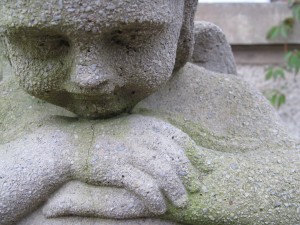“The soul of society is law; the soul of community is love.”
-Roberto Rossellini
About a year ago, I was at a women’s retreat where one of the icebreaker questions for Friday evening was something like, “Who do you want to be when you grow up?”
As we went from woman to woman, a bit of a theme emerged, many saying in one way or another that they hoped to become a “crazy old woman” as they aged. Though those responses were obviously humorous, I think they also referenced a deep desire on our part to live with more freedom, especially freedom from “people-pleasing.” As the gender more known for our relational awareness, we are also, though of course not exclusively, known for our inclination to relational accommodation. Sometimes that is healthy care; and sometimes it isn’t. But, I digress… back to the crazy old woman thing.
I saw a wonderful old film this weekend: Europa51. It is a “modern” day, well modern for the post war late 40’s Rome, artistic remake of the story of St. Francis of Assisi. The story line revolves around a woman who goes through a transformation that leaves her passionate about loving everyone and very out of synch with society. In short, she dared to become a “crazy old woman” before she had wrinkles. (If you want to see the film and have cable it’s on TMC soon!)
As Martin Scorsese notes in some of his commentary on the film, Roberto Rossellini, Europa51’s director said of the film’s message,
“People today only know how to live in society, not community. The soul of society is law; the soul of community is love.”
The wisdom of noticing and owning that core difference between society and community not only set the stage for this story, I believe it is key to understanding the story of Jesus as well as what it means to be his follower, both historically and today. In fact the movie reminded me of the story of another woman whose love created tension with others in the more “well-reasoned” society around her: the woman with the alabaster jar.
Bold beauty making
3While he was in Bethany, reclining at the table in the home of a man known as Simon the Leper, a woman came with an alabaster jar of very expensive perfume, made of pure nard. She broke the jar and poured the perfume on his head.
Though the record of this woman’s loving act is simply stated, it was not a simple choice. As is often taught, the perfume was an extravagantly generous offering, probably her entire “retirement account”, given freely in a moment of great passion. The abundance and lack of a measured approach is a critical part of the beauty of this moment.
The gift was not only generous it was also very sensual. Notice the words of the passage. Alabaster…perfume of pure nard…broke…poured. All these words engage the imagination of our eyes, nose, ears, and touch. John’s account says that the fragrance filled the room. Also note the absence of spoken words. It is as if they could only have distracted from fully absorbing the intensity of such an experience. This was a moment of overwhelming beauty, engaging the body, heart, and emotions.
This woman’s actions were very bold. Though anointing of the head is common in Scripture, for that act to be done by a woman is radical. Not only that, she did it publicly, in the presence of several men. Unmeasured generosity, overwhelming sensuality, completely unconventional. This was a shout not a whisper.
Even still, I think the most radical thing about this moment is that the creature is ministering to the Creator. Jesus is actively receiving the nurturing care and comforting ministry from the hands of this unnamed woman. That powerful, radical ministry came in the form of a deeply impacting experience of beauty: the jar broke, the oil flowed, fragrance saturated the air.
A harsh rebuke
4Some of those present were saying indignantly to one another, “Why this waste of perfume? 5It could have been sold for more than a year’s wages and the money given to the poor.” And they rebuked her harshly.
Somewhere along the way in our Christian tradition, the idea of being a good steward has become equated with the idea of being “practical.” Certainly, a case can be made that God is not always practical. After all, God makes winding rivers not straight highways. God built feast after feast into the Jewish calendar. And there was certainly nothing “practical” or “measured” about the ornamentation on the temple. In fact, the gospel itself is perhaps the most telling expression of God’s “foolishness.” Why go to such an extreme expense to save a people such as us?
Sadly, in the name of practicality disguised as good stewardship, many beauty-making moments are diminished, negated, or condemned even before they come to be. These harsh and visionless voices are not just outside us as in this story, many times they reign within. They seek to quench the beauty-making Spirit of God. They seek to deny the powerfully important and loving impact of moments such as these. Jesus acted quickly to make sure that did not happen here.
Helped by beauty
6“Leave her alone,” said Jesus. “Why are you bothering her? She has done a beautiful thing to me. 7The poor you will always have with you, and you can help them any time you want. But you will not always have me.”
Hear those words again. They are words for you, oh beauty-makers of the world. In the face of those voices, including our own inner voices that accuse, Jesus says (in effect) “You go girl!”
Jesus calls this woman’s bold act a “beautiful thing”…no other descriptors needed. He also leaves us with the sense that this experience has been helpful to him…just as the poor can be helped in the future. The future He will not have on earth.
Again, we note that Jesus is acutely aware of his pending death. How sad that in this powerful and rare moment of receiving comfort, He must move so quickly to the protection of this woman and the rebuke of her accusers.
Though there was no time to savor this experience in that moment, the overwhelming fragrance of such a precious perfume, especially in such an unimaginable abundance, must have lingered with Jesus for many days. (Unlike many of us, Jesus did not bathe every day.) My guess is that this fragrance was perhaps the only point of comfort and goodness Jesus carried with him into the garden and the courts. Before Pilate and while he was beaten. The fragrance on his head mixing with the bloody crown of thorns. Perhaps, it even endured to the cross. Jesus was indeed helped by this moment of beauty. …
A radical reaction
10Then Judas Iscariot, one of the Twelve, went to the chief priests to betray Jesus to them. 11They were delighted to hear this and promised to give him money. So he watched for an opportunity to hand him over.
A part of reading the power of a moment is to look at the response it draws from the opposition. It is not unusual, though it is generally unexpected, for beauty to draw such a venomous response as Judas’. Judas, as well as Jesus, was very impacted by this pervasively powerful experience. His lack of ability to understand or agree with Jesus’ support of her actions further alienated him from the One he once called teacher.
A part of beginning to own the powerful contribution of beauty making is to also own the strength of the opposition to it. We cannot expect beauty making to be smooth sailing. Many will seek not only to avoid this form of love but to actively destroy it. Moments of beauty like this are not trivial, they are an important part of the gospel being lived out into our world. They are worthy of the fight. Just as Jesus was helped by this woman long ago, so, too can we use beauty making to help His body still on earth. Let us learn to maximize our uniquely feminine gift by living well our language of beauty making.
As is most often the case, our greatest enemy will be within. When beauty draws the fire of the enemy, we are tempted to join the ranks of that enemy, avoiding it at all costs. In moments such as those, tell again this story, hear again Jesus’ affirmation of beauty. May it also be said of each of us “she has done a beautiful thing to me.”
-Excerpted from The Feminine Soul
So, what kind of societal tension is emerging around you as you love well and nurture the “crazy old woman” inside of your soul?











